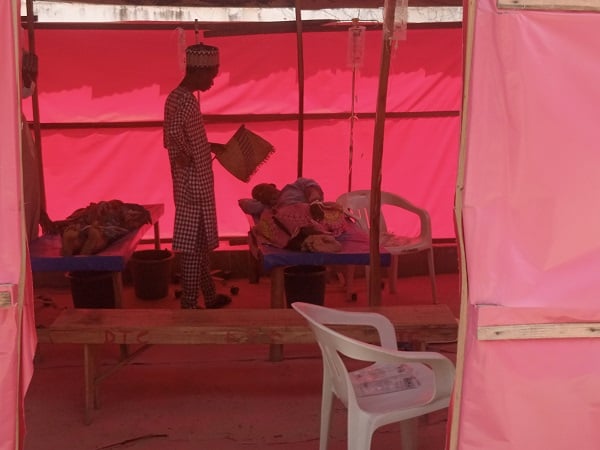A young man with a cholera patient in Kano
A total of 2,187 confirmed cases of cholera, including 233 deaths, have been recorded from January 1 to September 25, according to the Nigeria Centre for Disease Control (NCDC).
The agency said the cases and deaths were reported from 31 states.
“Following a recent increase in the number of cholera cases, the multi-sectoral National Cholera Technical Working Group (TWG) in collaboration with partners has been supporting affected states in risk communication, active case search, case management, and water, sanitation, and hygiene (WASH) interventions,” the NDDC said on Thursday in a public health advisory.
“The NCDC-led multisectoral TWG includes representation from the Federal Ministries of Environment and Water Resources, the National Primary Health Care Development Agency (NPHCDA), the World Health Organization (WHO), United Nations Children’s Fund (UNICEF) and other partners.”
Advertisement
The NCDC said the outbreak has been worsened by limited access to clean water and sanitation facilities, open defecation, and poor hygiene practices.
It said it has, therefore, supported the affected states with commodities for case management and laboratory diagnosis, materials for risk communications, and response guidelines.
“However, medical interventions alone are not sufficient to address the root causes -water, sanitation, and hygiene (WaSH) – of cholera outbreaks,” the advisory reads.
Advertisement
“Cholera is a waterborne disease, and the risk of transmission is higher in areas that lack adequate sanitation facilities and/or a regular supply of clean water. Unsafe practices such as improper disposal of refuse and open defecation endanger the safety of water used for drinking and personal use. These practices lead to the spread of water-borne diseases such as cholera. Without proper WaSH, Nigeria will continue to be at risk of cholera outbreaks along with the associated suffering and deaths.
“The long-term solution for cholera control lies in access to safe drinking water, maintenance of proper sanitation (especially the discontinuation of open defecation) and the practice of hygiene. We continue to advocate to State Governments to prioritise action for solutions that ensure access to and use of safe water, basic sanitation, and proper hygiene practices in communities.
“We also urge Nigerians to keep their environments clean, only drink or use water that is boiled and stored safely, ensure food is cooked and stored in a clean and safe environment, avoid open defecation, and wash their hands regularly with soap and running water.”
Advertisement
Add a comment






